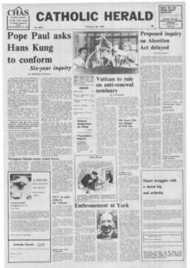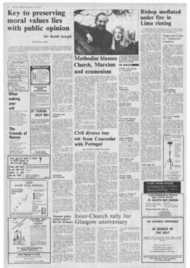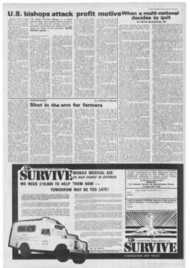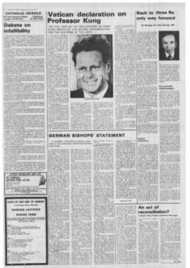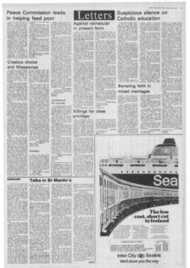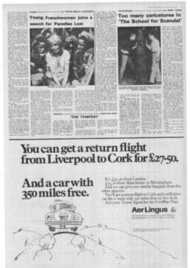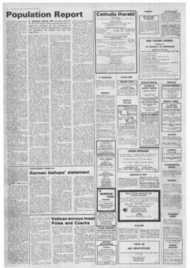Page 8, 28th February 1975
Page 8

Report an error
Noticed an error on this page?If you've noticed an error in this article please click here to report it.
Tags
Share
Related articles
Vatican Changes Mind On Banning Population Book
Birth Control Stressed In Banned Book
Special Report On Work With Problem Family
No Slick Answers On World's Big Problem
Request For Vatican
Population Report
Fr Michael Ingram OP, secretary-general of the commission which prepared the book on population problems for the Conference of International Catholic Organisations, describes the opposition the project met from the beginning
In the course of the publicity given last week to the attempted suppression of a
book on population problems I became fully aware for the first
time (though I had been used to seeing it happen, and should have known better) that a rebellious priest makes better news than a loyal one.
I gave virtually identical interviews to several papers and broadcasting interviewers. The resulting reports were so different that I have made a collection, and will offer them to any scholar of the New Testament Synoptic problem to see if he can decide what the historical facts were, and what I actually said.
Jr he can do either he will be a man of very remarkable genius_ So I am using an invitation from the Editor of the Catholic Herald to write a brief history of the project.
Various Catholic societies have branches throughout the world, and have their status recognised by the Vatican as in ternational Catholic organisations. Some also have consultative status with the United Nations. They occasionally meet together, and when they do so they form the Conference of International Catholic Organisations.
One such conference commissioned Canon Moerman, Secretary-General of the International Catholic Child Bureau, to convene a working group of 'experts to make a report on world population problems to provide information and guidance, and make a specifically Catholic contribution to World Population Year, Canon Moerman asked me to become secretary-general of this commission and editor of the book, and I took up residence in Geneva to work full time with him.
From the very beginning the commission met diplomatic difficulties. The Holy See was anxious that the conference should not set itself up as a rival voice to the Vatican, and the United Nations, which was engaged throughout in diplomatic negotiations to persuade the Vatican to take part in the events of the year, was hesitant about giving us too much official recognition.
We were tentatively approached by the World Council of Churches to consider making the whole thing an ecumenical venture, but it withdrew when it thought it would jeopardise its relations with the Holy See.
It was for these reasons that a work of major significance for the Church and the world received little publicity.
Within the conference itself there was a great deal of disagreement about the project. One may dislike the words "conservative" and "progressive", but one cannot deny that many members in the Catholic Church align themselves in a partisan way in groups to which these words are referred.
I would like to think that , both parties were matched intellectually and could enter into dialogue, but the unhappy fact was that it seemed virtually impossible to have an intelligent argument with "conservatives" in the group.
Within the commission we argued heatedly about every sentence in the book as it was being written, and every argu
ment was backed up with facts, and science. But when we en
countered "conservatives" from the conference it was quite another story.
If I quote an example you will. perhaps, see what I mean. One passage mentioned an aspect of family life and included the phrase "as happens to day in China". It was insisted that this should be removed in case we appeared to approve of anything happening in China.
This petty quibbling marred our debates and correspondence, and we often made corrections in non-essential matters just to keep the peace. MI the authors of the book eventually became resigned to having their favourite passages re-written, and I think I lost more material than most. I was hurt and angry as anyone would be in the circumstances, especially when the critics said that what I wrote was not wrong but controversial, ie, thoughtprovoking. However, as the work of Canon Moerman and myself became more widely known in other circles, and we were increasingly called upon to take part in international meetings and seminars, there emerged the possibility of publishing our work independently arid that provided compensations by giving greater' freedom. The last section of the book, which deals with religious and moral questions, caused the most difficulty. Three different Spanish theologians and canonists were invited to draft chapters, and we had to reject their contributions as being likely to bring the whole project into ridicule because they simply repeated once more those arguments in defence of "Humanae Vitae" that have been rejected both within and without the Church. One even discussed the canonical right of the sperm to unite with the ovum.
I was then commissioned to set up a sub-group of wellknown experts and re-write the whole section. I first drafted a paper, circulated it among nearly 100 correspondents and then revised it according to their criticisms.
Later I went to Louvain where I reworked it with a professor of moral theology, called a meeting in London of some 15 experts and revised it again. It was submitted to the plenary sessions in Paris and rejected as being too controversial.
At this point there was an intervention from outside, and I was invited to speak at a Population Conference in Geneva. I gave a summary of the rejected paper, and its publication was immediately commissioned by the International Council for Voluntary Agencies, and money was given by a charitable trust in America. The text was to be
distributed free to all interested, and over 1,000 copies were sent to Bucharest to be 'distributed among the delegates.
Meanwhile, Canon Moerman WEIS appointed to the Planning and Management Committee of the Tribune at the World Population Conference (where he delivered the opening speech and closing message); Fr Arthur McCormack, our leading demographic expert, was dismissed from the Pontifical Commission on Justice and was appointed Consultant to the United Nations.
The question of finance was a thorny one. The international Catholic organisations which had commissioned the work did not give one penny towards the cost, and we had to approach a large non-Catholic trust for the money. The trust insisted that my salary should be about £2,000, hut because we were so short of money I gave half that back to ensure that the book would appear in three languages. The Vatican took a dim view of all that was going on, and we encountered difficulty at every stage. When this was open and straightforward we could cope, and adapted ourselves to whatever criticisms they made, short of stopping publication. But sometimes the opposition came in the form of unbelievably petty harassment, which only hardened our determination to go ahead with publication. "The book WILL be published" became the warcry with which Canon Moerman and I encouraged each other.
Meanwhile, the strain had taken its toll of my health. I developed a migraine which lasted for three months, and when my stay in Geneva came to an end, I was relieved of my post, appointed special consultant to Canon Moerman, and continued to work part-time with a secretary in England. My name was taken from the titlepage, and Canon Moerman's inserted instead, which meant that he now had to bear the very heavy burden.
I attended the World Population Conference in Bucharest and there was told openly on several occasions what a bad impression the delegation from the Vatican was giving. United Nations officials who had refused us official recognition in favour of diplomatic relations with the Vatican were disillusioned.
Representatives of the World Council of Churches spoke publicly of the way they had been let down by broken promises and fickleness. We avoided open confrontation with the Vatican delegation, and worked with them as far as possible, having meetings and discussions with them. But we also encountered great opposi tion from some Catholic elements present, and with these we were in more open confrontation. It has to be said that some of their interventions in the public debates brought ridicule on the Church.
However, the hook proved too controversial for the Conference of International Catholic Organisations, and it decided it could not be published in its name. Since ir had been so carefully worded, there was not one statement in it that could be taken to be opposed to the Papal teaching. But by Repudiating the book, the conference lost rights to control its publication. It tried to prevent any mention of the conference in the book, but we decided it was a matter of honesty to describe the book's origins, and it was left at that.
A Paris publisher signed a contract to publish in three languages, and Canon Moerman signed on behalf of the authors. When the book emerged from the press a delegation of the Holy See went to Paris to order the suppression of the book.
The publishers pointed out that Canon Moerman had no legal right to do so, since the authors held the copyright. Since Canon Moerman had written the introduction, he was entitled to change that, but no other changes could be made. A compromise was reached and the publishers agreed to remove references to the conference from the introduction.
I criticised this decision as it seemed to me to be immoral to suppress the truth. But the decision was not ratified by the Cardinal Secretary of State who would not be satisfied until the book was suppressed, and this would mean the purchase and destruction of the copies that had already been printed. The story leaked to the press, and the Cardinal l finally allowed the publication to go ahead.
Along with the other authors I was consulted about both the compromise and the suppression, and I pointed out that since the conference had repudiated the book it had no control. Since the Catholic Church had not contributed any money, the trust which had given money would have to be repaid, and I would take legal action if necessary to recover my £1,000. I said also that the authors would want to protect themselves against loss and damage from the suppression of the book,
There are serious moral issues discussed in the book, and it is the discussion that is criticised, together with the neutral attitude that authors take. There are also serious moral issues involved in the behaviour of the ministers of the Holy Father, and I would like to think that if he knew the full facts he would be ashamed of what was being done in his name. It has been those closest to him that have been involved with us and advising him, and we were not able to communicate with him except through them.
The behaviour of some of them has not been a credit to the Church, and their manner of dealing with the publication issue has given free publicity to the book. I hope the matter will rest here, and the world will be able to judge the merits or otherwise of the book for itself.
blog comments powered by Disqus


